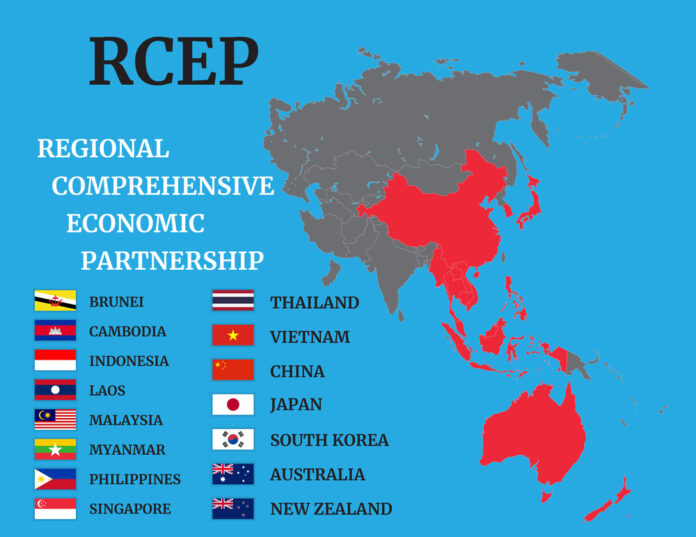The head of the employers’ association of the Philippines cheered the ratification of the Regional Comprehensive Economic Partnership (RCEP), but stressed the need for adequate safeguards and support for businesses and farmers that will be affected by the country’s participation in the mega trade deal.
Sergio Ortiz-Luis, Jr., president of the Employers Confederation of the Philippines (ECOP), the single voice of employers’ organizations on employment and labor issues, joined other leaders in the business community in welcoming the 21 February 2023 ratification of RCEP by the Senate.
“Our neighbors have six, eight trade agreements that they’ve entered. We’ve only so far done Japan (JPEPA) and the ASEAN so we’re very late…. It’s a good thing we have decided to join it,” said Ortiz-Luis on the long-awaited ratification.
He said what is important now is proper implementation of the accord and the commitment to protect those that might be disadvantaged by the free trade agreement.
“I think some of the apprehensions of the oppositors, mainly the farmers, have been addressed. Among the tariff lines that they’re afraid of, I think most of them are exempted, like rice, onions, meat and the likes,” he added.
“What we should really address now are the safeguards that we have promised the farmers… our support for the interest of the farmers in terms of supply of better seeds and fertilizers and… water all around the year… so that our farmers can really be competitive.”
He also emphasized the importance of curtailing smuggling. “Smuggling will still be a problem with or without tariffs. This can make the lives of the farmers difficult.”
On how the government can promote exports under RCEP, Ortiz-Luis, also the head of the Philippine Exporters Confederation, Inc. (PHILEXPORT), the umbrella export organization in the country, said they hope the current government will again make exports the lynchpin of the country’s economic development.
He expressed optimism that the government agencies that are involved in export development will give “special attention to export.”
“We hope that now they would again, with the guidance hopefully of the President, give the proper interest and push to export,” he added.
He noted that the country is a beneficiary of the GSP+ program, “but we are not benefitting much from it because we lack the push, especially in the garment sector.”
He further remarked that “many of the promises also of the Export Development Act, incentives disappeared, and even now there are agencies that make it difficult rather than making ease of doing business [as] the program.”
“They make every move a fundraising in many of our agencies,” he said, without elaborating.
Ortiz-Luis said they believe the immediate benefits of the ratification will be an increase in exports and job creation. “In the export sector, we are looking at opening the markets for us because of the lower tariffs, so we are expecting that it would help us.”
But he again underscored that strong safeguards and proper implementation are crucial issues that must be addressed.
“The treaty itself is okay, but the way we implement things sometimes is different [and] whatever we say in black and white sometimes doesn’t happen especially in the area of smuggling.”
Ortiz-Luis had earlier said that RCEP’s unique and specific provisions can strengthen the Philippines’ economic interests.
The trade facilitation chapter provides more definitive and predictable commitments from the signatories, while allowing changes when it comes to openness and clearance of goods.
Moreover, exporters would have an easier time to comply with the preferential tariff treatment with the consolidation of the rules of origin in ASEAN.
The economic impacts of services sector liberalization and trade facilitation improvement in RCEP are much more significant than the tariff reduction offered in other FTAs, he added.
Additionally, several RCEP provisions, such as those on e-commerce, government procurement, and competition, are not found in other FTAs.
The FTA is the world’s largest, a 15-nation trade grouping comprised of Australia, China, Japan, South Korea, New Zealand and the 10 members of the ASEAN,.
RCEP took effect on 1 January 2022 for 10 parties: Australia, Brunei Darussalam, Cambodia, China, Japan, Laos, New Zealand, Singapore, Thailand and Vietnam. It then entered into force for South Korea on 1 February 2022, Malaysia on 18 March 2022, and Indonesia on 2 January 2023.
The FTA, covering a third of the world economy, will eliminate 90 percent of tariffs in East Asia and Pacific countries and could reportedly further boost intraregional exports by $42 billion.
ECOP, PHILEXPORT chief seeks safeguards, support for local businesses with RCEP ratification
Related Stories







